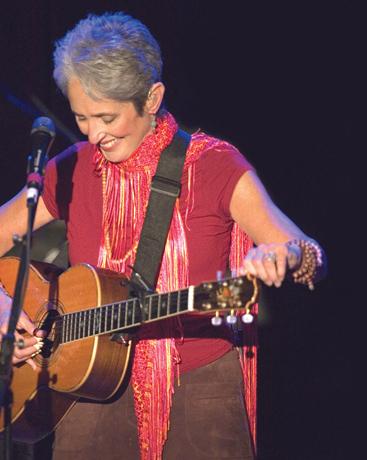Singer-Citizen Joan Baez: A Conversation of Past and Present
By • June 17, 2013 0 2536

I was a very young man when I first heard that immaculately clear, piercing and beautiful voice that belonged to Joan Baez singing folk songs I’d never heard before. It was the year of the folk singer in the music world, the protest singer, the emergence of the coffee house singers and folk festivals. In 1962, she was on the cover of Time Magazine, a thick painting depicting her strumming a guitar, long black hair, blue jeans and barefoot in a wicker chair of some sort.
Her singing, the look, the whole aura and story affected a lot of people deeply, myself included—it got me into Dylan, Sonny and Terry, Pete Seeger, the blues and folk music, the protest songs that we never sang in the Midwest or in the army.
Baez will performing at Wolf Trap, as part of a tour with the Indigo Girls at Wolf Trap Wednesday, June 12, singing some of those songs, and maybe songs from her last album, “The Day After Tomorrow.” If notes on Baez’s website give any hint of what else: songs like “Jerusalem,” “Susanne,” “Diamonds and Rust,” “It’s All Over, Baby Blue,” “God Is God” or, quite possibly, even “We Shall Overcome,” depending on the audience and its mood.
“Hello, it’s Joan,” Baez says when she calls. For a minute,I didn’t know quite what to say except thank you. I hadn’t expected this voice, because all I remembered really was the voice that sang so incredibly, or the stories and the facts and the biography, but this voice was conversational, a phone call from the here and now, not the past.
For the past seven years or so, Baez had been living in Riverside, Calif., with her mother, whom people called “Big Joan,” and who had just passed away April 20 at the age of 100. I offered my condolences. “I have to tell you a funny story,” Baez said. “We had planned a big 100th birthday party for her. At first, she didn’t want to have anything to do with that, she didn’t want a party, but then she relented, We had around 100 people over, and it was fine, and then we asked her what she wanted for her birthday. She stood there, and she said, ‘I want to drop dead.’ And you know, a week later, she passed away. It was the right time. I think is what she meant, and we were all there for her.”
Her mother was Scottish and her father, Albert Baez, a physicist and inventor, was born in Mexico. Her sister Mimi Farina was also a noted folk/protest singer and activist; she died of cancer in 2001.
You think about loss in a conversation like this, but it wasn’t like that. Baez—simply by being who she’s been for more than 50 years of singing and speaking out and being in places and lending her name and time to causes and walking with Martin Luther King, Jr., and that voice and that body of work—can bring an aura to any conversation, it could be a too-serious kind of talk that leaves out the person.
But her conversational voice is warm, and her singing voice, for that matter, has changed. “It’s time, that does that,” she says. “I occupy the middle ground, my voice, it’s an instrument, you have to take care of it, and I’m sure there are people who expect the old voice, and you can’t do that as much any more. “ Listening to some online offerings—“Diamonds and Rust” comes to mind but also the much, much later “The Day After Tomorrow,” a Steve Earl-produced album from 2008—the voice is richer and a little more diverse in its travels. It’s an older voice, but not like the old voice.
Baez finds a lot of comfort and pleasure in touring—her son Gabriel plays with her on the tour, and the rest are friends to some degree or another. “It’s like being with family, a road trip, it’s just warm and good,” she says. They’ve here, they’ve been in Colorado and Kansas and move on to New Jersey, Massachusetts and New York.
She knows her iconic status, but it’s the whole package and persona that’s the icon—the activist, her travels to the Middle East, Africa, singing at the side of Nelson Mandela, going to the suffering places and speaking and singing truth to power.
Her look has changed, the hair is short and grayer, but the image of the new girl on the block in music remains, as does the almost wounding effect of the voice.
“You know, most of the time audiences are good,” she said. “They’re people that know the music, the songs, they’ll get into it or respond, they’ll sing along. And every now and then, you get nothing, and you think, ‘Oh, boy, we’ve got our work cut out for this.’ You get all kinds of people—my generation, sure, and it gets a little nostalgic then, but also young people, and I think people who care.”
Her kind of music—the kind that seem to be about what’s going on in our daily and worldly life, isn’t much in evidence among contemporary singers, although performers today are quick to raise money and sing for causes, but their music lags behind. There are, in short, few if any passionate singer-citizens like Joan Baez around, and there is still only one Bob Dylan.
“Sure, he still does that, but then, he’s always done it,” she said of Dylan, the pied piper of the here and now, the heart within, the cool attitude without.
Baez expressed some disappointment with President Barack Obama, whom she endorsed in his first run. “I think, I don’t know, I thought he had the potential to create a movement, and that hasn’t happened,” she said.
She frets about the times and their dangers. “Maybe these are times when you savor every little thing and make them into the things that matter.”
Her voice over the phone still rings true and clear as spring water. It’s the woman who said in a PBS special about her that “social justice is the core of her true life, looming larger than music.” “It’s Joan”: Joan Baez.
- Joan Baez | Courtesy of Wolf Trap



